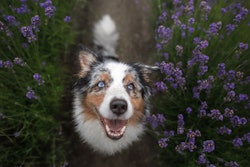
Australian investigators identified a native plant toxin, indospicine, as the cause of numerous dog deaths and illnesses clustered near Gippsland, Victoria, Australia. PrimeSafe and Agriculture Victoria authorities announced this advance in their investigation on July 21. As of that date, 14 dogs had died and another 45 sickened, reported the Australian Broadcasting Company.
“At this stage the investigation has no conclusive evidence of how the dogs have ingested the toxin, with pet food sources remaining a primary focus,” wrote Agriculture Victoria representatives in the announcement. “This complex investigation is ongoing with multiple lines of inquiry across the pet meat supply chain and testing continuing at laboratories across Australia.”
All affected dogs were young, healthy and vaccinated. Fresh and frozen raw meat sourced from Gippsland and sold between 31 May and 3 July is one common factor and potential connections are being investigated. The meat product was distributed state-wide, but was recalled by Maffra Knackery.
About plant toxins in dog food
Various plants of the Indigofera species produce indospicine toxins, according to a literature review published in the journal Agriculture, including some native to Australia. While all animals can suffer liver damage or fetal abortion after exposure to the toxin, dogs are highly sensitive to indospicine. Previous incidents have involved dogs poisoned by horse or camel meat containing indospicine. For example, more than 30 dogs died in Alice Springs, Australia after eating meat from horses that had fed on Indigofera plants in 1988.
Although Victoria hasn’t had problems with indospicine and dogs, similar problems have arisen in northern Australia, according to Agriculture Victoria.
Over time, indospicine can build up in the food chain as livestock eat Indigofera plants, some of which are use to make the dye indigo. Hypothetically, cattle or other animals grazing on these plants may have bioaccumulated the toxin in their tissues. That concentrated indospicine may then have passed from herbivore to omnivore as the livestock became raw dog food. However, this potential route hasn’t been proven.
PrimeSafe and Agriculture Victoria advised dog owners that fresh or frozen raw pet meat sourced from Gippsland between May 31 and July 3, should not be fed to dogs. Dog food businesses and pet food ingredient suppliers have implemented voluntary withdrawals and recalls of potentially affected products.
Recall of raw dog food products
The Gippsland Times reported that the meat came from Maffra Knackery, which expanded their product recall on July 22.
Knackery co-owner Karen Backman told the Gippsland Times that the company identified a unique purchase of animals from a region where the Indigofera plants may grow. The animals were intended for the export market and human consumption, but were stuck in Australia by pandemic-related border restrictions and export constraints.
The recalled raw pet foods include:
- Maffra District Knackery Mince
- Maffra District Knackery Kennel
- Maffra District Knackery Horse
- Backman’s Greyhound Supplies Mince
- Backman’s Greyhound Supplies Kennel
- Backman’s Greyhound Supplies Horse














